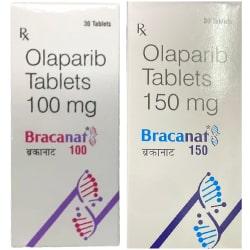Description
Introduction to Olaparib Tablets:
Uses of Medicine: Olaparib 150 mg belongs to the class of cancer medicines known as PARP (poly [adenosine diphosphate-ribose] polymerase inhibitor) inhibitors. Patients, Healthcare Professionals (HCP), or Hospitals can buy Olaparib 150 mg Tablets online from India through Indian Generic Medicines (a trusted Olaparib Supplier, Exporter, and Contract Manufacturer in India) for the management and treatment of:
Olaparib 150 mg is prescribed for the treatment of patients with Ovarian, Breast, Pancreatic, and Prostate cancer. This oral therapeutic drug can be administered alone or along with other anticancer medicines.
You should not take olaparib if you’re allergic to the drug itself or to any part of the tablet. If you suddenly develop difficulty breathing, chest discomfort, fast heartbeat, fever, cough, or wheezing, call your doctor or get to the nearest hospital right away. Blood tests will be done before you start the therapy and then once a month, because olaparib can lower the levels of red blood cells, white blood cells, and platelets. Make sure to inform your healthcare team if you have ever been diagnosed with lung, liver, heart, or kidney problems before the first dose.
Using this medication during pregnancy is not recommended because there’s a risk of fetal harm and miscarriage. Women of childbearing potential should therefore confirm a negative pregnancy test before starting therapy. Continuing reliable contraception for at least six months after stopping the drug is also advised. While on therapy, nursing is discouraged, as it’s uncertain whether the Olaparib 150 mg tablet transfers into breast milk. For the same duration, male patients should not donate sperm for at least three months following the last dose. Always let your healthcare provider (HCP) know about every product you are taking, whether it’s a prescription medicine, an over-the-counter drug, a vitamin, or a supplement.
Dosage and Side Effects
The recommended dosage of Olaparib is 300 mg taken orally twice daily, with or without food. In circumstances where a patient misses a dose of this oral therapeutic drug, instruct the patient to take their very next dose at its scheduled time. Tablets are meant to be swallowed whole. It is not advisable to chew, crush, dissolve, or divide the tablet.
FAQ's
What is Olaparib Tablet?
Olaparib Tablet is a poly (ADP-ribose) polymerase (PARP) inhibitor used for the treatment of patients with advanced or recurrent ovarian cancer, metastatic prostate cancer, early or metastatic breast cancer, and metastatic pancreatic cancer.
How are Olaparib 150 mg Tablets administered?
Olaparib 150 mg tablets are taken orally, usually twice daily, with or without food, exactly as prescribed by the healthcare provider (HCP). Swallow tablets whole with water; do not crush, chew, or split.
How should I store Olaparib 150 mg Tablets?
Store at 20°C to 25°C (68°F to 77°F), excursions permitted to 15°C to 30°C (59°F to 86°F). Store the medicine in the original bottle to protect from moisture.
How much do the Olaparib 150 mg Tablets cost in India?
Olaparib Tablets are available in India at competitive and reasonable prices, though the cost may vary depending on the supplier and location. For those looking to buy Olaparib online legally and without hassle, Indian Generic Medicines (IGM) offers an easy and reliable solution. To inquire about the current Olaparib 150 mg cost in India, simply call us at +91 8130290915 or dial our TOLL-FREE Number 1800-889-1064. You can also email us at info@indiangenericmedicines.com for detailed pricing information and assistance.
Where can I get Olaparib 150 mg Tablets at the best price?
To ensure you receive genuine Olaparib at the most competitive price, kindly reach out to Indian Generic Medicines (IGM) today. We are committed to offering the best prices for Olaparib from India. We can match or beat the cost offered by other suppliers or distributors in the market. Contact us via Call/WhatsApp at +91 8130290915, or use our TOLL-FREE Number 1800-889-1064. Alternatively, you can email us at info@indiangenericmedicines.com. Please note that a valid medical prescription is required to buy Olaparib Tablets.
Are Olaparib 150 mg Tablets available in India?
Yes, Olaparib Tablets are available in India as a prescription medicine. This pharmaceutical drug can be legally obtained through India’s authorized distributor network, which spans major cities such as Hyderabad, Ahmedabad, Mumbai, Bangalore, Delhi, Chennai, Kolkata, and Pune. To buy generic Olaparib online from India, a valid prescription from a healthcare professional (HCP) is required. Indian Generic Medicines (IGM) can assist you in sourcing generic Olaparib from India’s top suppliers.
Can you send Generic Olaparib 150 mg Tablets to foreign destinations?
Indian Generic Medicines (IGM) specializes in the export and delivery of generic Olaparib Tablets at the lowest prices. We facilitate the shipment of Olaparib Tablets to various countries, including but not limited to the UAE, Australia, the USA, Saudi Arabia, Canada, the UK, Germany, France, Belgium, Bulgaria, Brazil, Kenya, Japan, and South Africa. Whether you are located in Australia, North America, South America, Eastern Europe, Western Europe, the Middle East, Africa, Central America, or Asia, IGM can assist in delivering generic Olaparib as per your requirements. For more information on international shipping options, contact us today.
What is the procedure for buying Olaparib 150 mg Tablets from Indian Generic Medicines?
To buy Olaparib online from India through Indian Generic Medicines (IGM), patients need to fill out the order form or send an email to info@indiangenericmedicines.com. Alternatively, you can send a WhatsApp message to +91 8130290915 or call our TOLL-FREE Number 1800-889-1064. After receiving your inquiry, we will provide you with the details regarding the Olaparib 150 mg price in India and the procurement procedure. Please note that your order will only be confirmed once we receive a valid prescription from your physician.
Is it safe to buy Olaparib 150 mg Tablets online from India?
Yes, buying Olaparib Tablets online from India through Indian Generic Medicines (IGM) is safe, especially if the drug is not registered or unavailable in your country. IGM facilitates the legal export of Olaparib 150 mg to various countries. We ensure that you get genuine therapeutic drugs at the best price. Our service ensures compliance with all necessary regulations, providing a secure and reliable way to access generic Olaparib from India.






